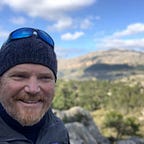Accelerating Bioregional Regeneration & The Global Regeneration Co-Lab
A conversation between David Hodgson and Daniel Wahl
On April 14th I had an opportunity to catch up with an old friend from the International Futures Forum. David Hodgson and I have known each other for 11 years and with his aptly named company Hummingbird Labs I have witnessed him being a hyper-connector and weaver of collaborations across many different spaces from the tech world, finance, futurists & scenario planners, social impact innovators, and increasingly people in the space of regenerative agriculture, ecosystems restoration, and bioregional regeneration.
In this conversation between old friends I asked David about the work he has recently done with others to launch The Global Regeneration Co-Lab.
The Co-lab is “a network of trans-disciplinary innovators, from around the world, coming together to solve the challenges facing bioregional regeneration.”
David explains how the co-lab came into being and how it works so far. We explore the links and synergies between the co-lab and parallel initiatives like the ‘Earth Regenerators’ learning community that Joe Brewer has recently created.
See: https://earth-regenerators.mn.co
David shares some of his insights into the different initiatives underway to help finance and divert philanthropic money towards regenerative projects around the world. Addressing the difficulty of getting the initial funding, and how many place-sourced and appropriate scale projects need small funding but consistently and how the kind of sums that large funders consider small would actually be too much for such projects to receive.
We also explored the tension between working on global knowledge exchange and weaving the meta-networks of collaboration on the one hand and focussing on local and regional transformation in depth on the other hand.
Is it possible or even sensible to bring a group of clever, well trained and skilled people into a ‘hackathon’ on what to do with a certain bioregion?
Or maybe such events “enrich the creative conversation” that later turns into something else, but inspired by the seeds that such events might plans.
How do we take the deep insight of starting from potential rather than starting from problems into the work of bioregional regeneration?
How do we invite people into the ongoing evolutionary process in deep reciprocity with place, rather than pretend that we can create final solutions or provide lasting answers?
David shares how people can join The Co-lab and how the intention is not to grow the biggest network possible but to create a very diverse group of people who have the skills and level of personal development to work with others.
David offered his view on how important glocal bridging is critically important, and compares it with the relationship between cells in a body. This trigged me suggest we could use “the osmotic balance of glocal” as an organising idea to explore this dynamic. I must write about this some more!
We also went into addressing the double edged sword of technology use and how dependent we might make ourselves on even more technological application.
We touch on the danger of technological colonialism that would mean that if you want to be a regenerative farmer paid for your effects on soil and landscape and carbon drawdown you would have to be wired into remote sensing or cryptocurrency systems that have no analog equivalent for those who might want to choose a less techno-addicted path.
In that context we also addressed the danger of setting up a multi-capital accountancy system with the good intention of wanting to give value to social and ecological relationships and stores of value and in the process actually becoming complicit in the enclosure of them as they are subsumed in the money economy.
We spoke about the mistaken ‘life boat’ motivation for creating the self-reliant bioregions, as if they could flourish without all of life and all of humanity flourishing. Even some far-right and xenophobic currents in society are agreeing with a regionalisation agenda but for all the wrong reasons.
In short, we had a wide-ranging and somewhat open ended conversation where we touched on many facets of what is emerging and explored dilemmas to navigate and questions to ask, without pretending we might have the answer for all of them. That for me is the true spirit of the ReGeneration rising.
Here is the link to the recording. Enjoy!
https://www.youtube.com/watch?v=Pae1v2v1uTQ&t=85s
(I have no idea why Medium is not embedding the video right now, but the link works.)
—
If you like the post, please clap AND remember that you can clap up to 50 times if you like it a lot ;-)!
Daniel Christian Wahl — Catalyzing transformative innovation in the face of converging crises, advising on regenerative whole systems design, regenerative leadership, and education for regenerative development and bioregional regeneration.
Author of the internationally acclaimed book Designing Regenerative Cultures
Please consider becoming a Patron:
https://www.patreon.com/DanielChristianWahl?fan_landing=true
